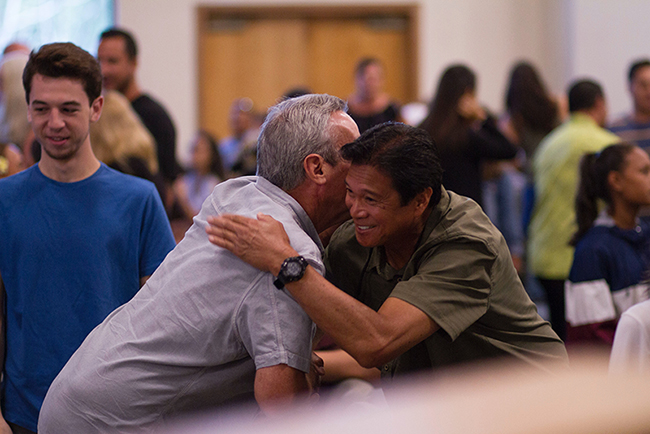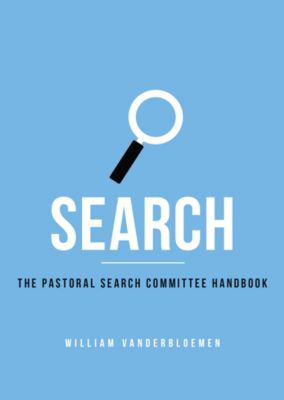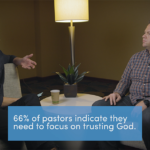
While there’s not a uniform approach to transition when a pastor leaves a church, we can glean insights from those with recent experiences.
By Lizzy Haseltine
It’s difficult to hear that your lead pastor is leaving—for any reason.
Where do we go from here? What will the interim process look like? Will other people leave the church?
In May 2022, my thoughts were rattled with these questions when I learned our senior pastor was leaving First Baptist Church in Charlotte, North Carolina. Over the past 18 months, I have seen our church transition and grow through a challenging period.
A new head pastor will begin his role at our church at the beginning of 2024. In the meantime, as I look around the filled pews, I recognize how our church has trusted, surrendered, and prayed to God during undesirable circumstances.
This time of uncertainty may have unified our church now more than ever. Over the last year and a half, 43 people have joined our church, including 15 through baptism.
While there’s not a one-size-fits-all approach to helping a church through this transition period, I spoke with two pastors on our church staff, executive pastor Scott Vail and worship arts pastor Mark Christian, to receive insight.
How should a church staff organize itself after a head pastor leaves?
Vail: When the resignation took place, I was the acting lead with the staff meetings. My first goal was to get the staff cohesive, unified, and moving forward in a healthy way. In transition, you sometimes don’t know what people are thinking or how they’re feeling. Certainly, when a senior pastor leaves, there’s disappointment and discouragement and so forth. I wanted to work to bring healing and leadership that was compassionate. I was not trying to do a lot of vision-type stuff. That’s proven, I think, really successful.
On the church side, when there isn’t any clear leadership, that’s when the people get concerned. So, we realigned our executive team. We work together to make 99% of our decisions unanimous among the three of us before we move forward and communicate to the staff or the church. The church saw a united front of not a leader, but a plurality of leaders. We spoke with one voice.
How did you decide to hire an interim pastor?
Vail: The first summer, we invited some prominent pastors to do a summer series. We called it “Summer Tour,” kind of like a band going on tour somewhere throughout the United States. During that summer, we actually grew. It was refreshing. But we knew long term that wasn’t going to work out because people would need some stability or consistency. Toward the end of the summer, we looked for an interim.
I’ve been a senior pastor at two churches prior to this. When I came into my last one, there were two associate pastors who both wanted that position. They alternated preaching for about a year. When the church decided not to go with them and brought me in, there was some animosity. People really loved to hear them preach, but it put the incoming pastor at a disadvantage. That’s what made our decision.
How did you lead people well who had a lower morale during the transition?
Christian: Frankly, it’s phone calls and personal touches. I went back to reaching out to people and having conversations. As opposed to taking the approach with social media or sending a text or email, I found one of the best ways to encourage discouraged people was personal interaction.
“As opposed to taking the approach with social media or sending a text or email, I found one of the best ways to encourage discouraged people was personal interaction.” — Mark Christian Click To TweetA lot of people just wanted to hear that the existing staff was OK. Because if we’re OK, they’re OK. And you know, God has sustained this church. It is a strong tool to be able to tell people this church has existed for nearly 200 years. And we’re going to make it through this as well.
How important is it to keep your congregation updated with the efforts of the pastoral search committee?
Vail: First of all, it’s a challenge because the pastoral search committee wants to keep the church updated as far as the process is concerned without revealing candidates, because that can be detrimental to the candidates’ home churches. The committee has to maintain a certain level of confidentiality, which restricts how much they share.
I know each time the committee made a report, I always wanted to hear more. But I respect the fact that they were trying to protect the identity of those who were being considered.
What are some of the ways that church leadership helped keep up engagement?
Vail: We worked hard and were diligent to have a fewer number of activities but to communicate and promote them better to have more engagement.
Recently, we had an Operation Christmas Child packing party and Operation Turkey Blessing [where people donated food items]. We had a great outpouring from the church because it was clearly communicated in an enthusiastic way.
When you try to do a lot of things that are sparsely attended and poorly communicated, you lose trust and people’s help. I think communication was the key.
“When you try to do a lot of things that are sparsely attended and poorly communicated, you lose trust and people’s help.” — Scott Vail Click To TweetChristian: One of the things I tried to do is create excitement. In our two-year period, I brought amazing guests and artists to our church.
With every artist, I had the conversation: “Our congregation has been without a pastor. Please encourage them. Sing songs that will bring hope and deliverance and comfort and peace to them.”
In addition, we do unified services about once every five or six weeks, where instead of having multiple services, we come together as one service. That has been super powerful.
And one of the biggest things we’ve done in our church is we’ve called people to serve. We have found, and I found in my own life, if you start feeling sorry for yourself, if you’re going through a depressing moment, the best thing you can do is to serve somebody. I’ve taught that to my kids. I’ve taught that to my family. And now I’m really excited that I’ve taught it to my church. The best thing we can do as a church when we’re in need is to serve those who are in need.
“The best thing we can do as a church when we're in need is to serve those who are in need.” — Mark Christian Click To TweetWhy do you think people kept joining and attending a church without a senior pastor?
Vail: I think by keeping the main thing, the main thing—the preaching and teaching of the gospel of Christ—and the fact that we kept on pursuing people to engage in baptisms and salvation and membership acted as an encouragement that, ‘Hey, we still have life here.’
Because we kept the core ministries like discipleship, our [small] groups are thriving. That’s where a lot of the care, engagement, and outreach takes place.
For permission to republish this article, contact Marissa Postell Sullivan.

Lizzy Haseltine
Lizzy is a content writer for non-profit ministries. For the past five years, she has traveled the world to tell stories of how God is moving.












